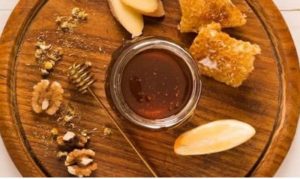
In modern times and amid growing dangers of sedentary lifestyle, people are becoming more conscious about what they are consuming. The ill-effects of foods like refined sugar, trans fats, and junk food are widely known and considering these foods can be turned into delicious recipes, many people look for their alternatives to reduce risk of chronic diseases. In place of sugar, many people add honey, jaggery or brown sugar, to get additional nutrients instead of empty calories.
These natural alternatives are also believed to be better for blood sugar management. However, experts say that jaggery and honey may have nutritional advantage over sugar, but they may still lead to sugar spikes. Here’s what you need to know. ( Aspartame may increase your cancer risk; list of foods that have aspartame from diet coke to sugar-free puddings)
Shamika Girkar, Clinical Dietician and Bariatric Nutritionist, Dr Aparna’s Laparoscopic and Bariatric Surgery Centre, Mumbai in an interview with HT Digital bust myths regarding sugar and its most common, naturally found alternatives like brown sugar, jaggery and honey.
Brown sugar
Brown sugar is white sugar with molasses added back to it. Molasses provides the rich brown colour along with a delicious flavour. It has slightly more minerals and moisture as compared to white sugar but both of them are still primarily composed of sucrose. Molasses from the brown sugar is removed by various processes to form the shiny crystalline white sugar.
Honey
Honey, in its purest form, has some amounts of vitamins and minerals and is devoid of any additional sugars or preservative additives. On the other hand, commercially sold honey often has extra components like flavours, sugar, and colouring added to it, with the aim to make it last longer on the shelf, look more appealing to customers, and tempt their taste buds.
Jaggery
Jaggery is made from the juices of palm trees or sugarcane and is gaining popularity as a replacement for white sugar. It contains minuscule amount of vitamins, minerals and antioxidants, it is still a concentrated source of calories and sugar.
Is it a good idea to substitute sugar with honey or jaggery?
Substituting jaggery or honey for refined white sugar can provide a small increase in nutrients in one’s diet. However, it’s not advisable to add extra jaggery or honey to food solely for the purpose of increasing nutrient intake. It’s generally more beneficial to obtain vitamins and minerals from lower-calorie sources.
Honey, maple syrup, brown sugar, and white sugar all have similar nutritional values. All are composed of glucose, fructose, and/or sucrose in varying amounts, provide an equal amount of energy (approximately 4 calories per gram), and contain insignificant amounts of vitamins and minerals.
So, what should you choose; sugar, honey or jaggery?
“When considering caloric content alone, none of the sweeteners-sugar, honey, or jaggery stand out as significantly better than each other. They all contribute extra calories to your diet. Therefore, if your primary concern is calorie management, it’s best to use these sweeteners sparingly or consider alternative ways to sweeten your food and beverages, such as using natural fruit sweetness or artificial sweeteners with fewer calories”, says Shamika Girkar.
While jaggery and honey may contain slightly more vitamins and minerals compared to refined sugar, the actual amount you consume in daily use is typically not sufficient to make a significant impact on your overall nutrient intake. Also, the adulterations that these products contain are a major lookout to make a decision.
“Considering the economic realities faced by a significant portion of the Indian population belonging to the middle class, it’s true that many people may rely on local stores that offer more affordable but often processed and less nutritious products. This situation can indeed lead to a diet that is high in empty calories, which may contribute to various health concerns over time”, says Dr. Aparna Govil Bhasker, bariatric surgeon at Saifee, Namaha and Apollo Spectra hospitals in Mumbai.
Understanding how jaggery, honey, sugar, or any other sweetener works is essential for making the right decision for yourself.
“Some people consider honey and jaggery as a superfood because it has more vitamins and minerals and a lower sucrose content than sugar. However, all three of them contain the same amount of carbohydrates (sugar) and the blood glucose peak will be the same when consumed in equal quantities. Also, when heated, both jaggery and honey will lose the vitamin and mineral content through evaporation,” says Girkar.
“In addition to that, added sugars boost calorie intake, the sensory effect of meals, and overall satisfaction but they are not essential for good health and nutrition. They can substitute nutrient-dense foods and lead to poor health outcomes by delivering calories without other necessary elements such as vitamins, minerals, or other important nutrients,” says Dr Aparna.
The key message remains that these alternatives are not a license to consume unlimited quantities of sweeteners. The best approach to sugar consumption is to limit added sugars in your diet and focus on whole, minimally processed foods




 Driving Naari Programme launched in Chandigarh
Driving Naari Programme launched in Chandigarh






























